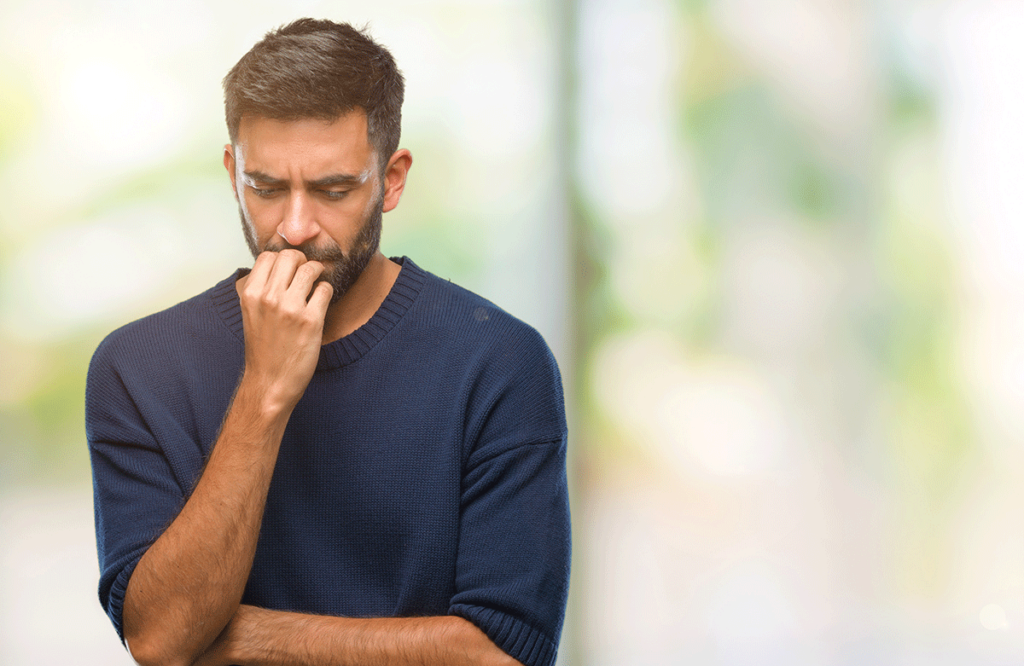Alcohol is frequently part of fun, celebratory occasions such as birthdays, holidays, promotions, and even watching sports events on TV. But it can also serve as a method of self-medication for anxiety, whether occasional or chronic. You might feel more relaxed and sociable after having a couple of drinks, but what’s it really doing for your anxiety? The relief you feel in the short term may actually be harmful to your mental health in the long term.
At Promises Brazos Valley, we understand how challenging it can be to navigate anxiety and how tempting it can be to have a drink to take the edge off. But we’re also well-versed in how alcohol and anxiety can trigger one another, setting you up for excessive drinking and, eventually, addiction. If you’re having trouble managing anxiety without alcohol, reach out to us at 888.483.7851 to learn about our dual diagnosis treatment program and how it can help you address anxiety and self-medication.
What Is Anxiety?
Anxiety is a common and natural response to stress, and most people feel anxious at some point in their lives. Taking an exam, going on a job interview, or going on a first date are all events that can leave you feeling anxious. The good news is that this type of anxiety is temporary and tends to fade shortly after the event.
Those who experience persistent and overwhelming anxiety may diagnose themselves with an anxiety disorder. There are several types of anxiety disorders, including:
- Generalized anxiety disorder (GAD)
- Social anxiety disorder
- Panic disorder
- Agoraphobia
- Separation anxiety disorder
- Selective mutism
- Specific phobias, such as fear of flying, driving, enclosed spaces, or heights
Depending on the type of anxiety a person experiences, the condition will have a varying degree of impact on the quality of their lives.
How Are Alcohol and Anxiety Related?
An individual who encounters occasional mild anxiety might not notice much of an impact on their quality of life. They feel nervous before an important meeting, then a sense of relief once it’s over, and they move on with their life.
However, someone with an anxiety disorder may often feel an overwhelming sense of fear and impending doom, sometimes without apparent provocation. For many, it can get to the point of avoidance of anything that induces anxiety, which can make their world very small.
Where does alcohol fit into all this? It’s one of the most commonly used tools for coping with anxiety. A few examples:
- A person who practices avoidance, as mentioned above, starts to feel lonely and depressed due to their limitations and turns to alcohol to escape.
- Someone with social anxiety disorder may numb their anxiety with alcohol before entering social situations.
- Someone with panic disorder may use alcohol to relax before an event that they’re afraid will trigger a panic attack.
Each of these people might feel a fleeting sense of relief from their anxiety symptoms when drinking, but the relief is short-lived and can ultimately exacerbate their symptoms in the long run.
The Effects of Alcohol on Anxiety
While you might feel less anxious while under the influence of alcohol, drinking isn’t a viable solution for anxiety disorders. Alcohol is a depressant that affects the central nervous system and slows down your brain function. This action interferes with your brain’s neurotransmitters that regulate mood. Alcohol may initially reduce anxiety symptoms, but it can disrupt your brain’s natural balance and potentially lead to increased anxiety once the effects wear off.
The cycle of worsened anxiety symptoms leading to increased self-medication with alcohol can create a harmful link between managing anxiety and alcohol use. You drink to cope with anxiety, the anxiety worsens, then you drink more to manage your symptoms, and the cycle continues.
Get Help for Anxiety and Alcohol Addiction at Promises Brazos Valley
If you’re feeling the adverse effects of alcohol on anxiety, you can find the support you need at Promises Brazos Valley. Call us at 888.483.7851 or complete our online form to enroll in our dual diagnosis treatment program to address alcohol addiction and anxiety together.

